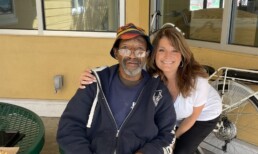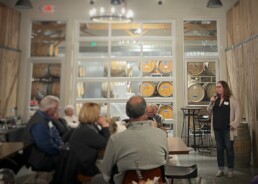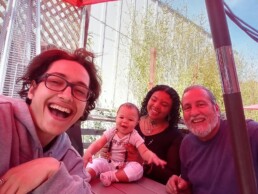Rex's Story
Rex Robinette was eleven years old when his sister Laura was born in 1963. “We shared a special relationship,” Laura says, “because my mom allowed him to pick my name.”
The eldest of the family, Rex was a model older brother to Laura and their brother Gary. Rex took Laura to the zoo and the Cleveland Orchestra. “I have no negative memories of him. He was a positive, happy force,” Laura says.
One family photo shows him, a handsome, clean-cut teenager, with his hands protectively on Laura’s shoulders. In another, he stands proudly in his army uniform on the staircase of the family home in Cleveland, OH. On the advice of his father, a veteran himself, Rex joined the army before being drafted in the hopes of getting a better assignment. In 1971, he left Cleveland and his little sister for Vietnam. He was 18 years old.
For Rex and Laura, nothing was ever the same again.
During his leaves over the years, Rex described being yelled at and spit at by protesters or people walking by. He told the family that in training at Ft. Bragg, officers told soldiers that if anyone threw a baby at them, not to catch it because the baby could be tied with explosives. By the time he came back from the service in ‘74, Laura remembers him being glad to be home – at the time, he still seemed like the Rex she remembers.
But soon, he started sleeping a lot, growing his hair long. Slowly, Rex started to change.
Then one day, three years after returning home from Vietnam, Rex disappeared.
Through family networks, Laura’s parents discovered that Rex and his girlfriend had left for California. They were living in their car and selling blood to get by. Rex’s mother asked a friend to pass a message on: Call home. We love you. We’re not angry. We just want to know you’re ok.
But Rex never called.
For nearly forty years, the family only heard rumors about Rex’s whereabouts. Then, last December, Laura visited the graves of her parents with her grown son, Drew.
Drew can remember the day clearly. He was visiting family in Ohio for Christmas. Standing in the cold at his grandparents’ graves, Drew was overwhelmed with curiosity about his unknown uncle Rex. While Rex had left the family before Drew was born, he had grown up with stories about his mother’s beloved big brother. Drew felt that people don’t just fall off the face of the earth – something must have happened to him. In that moment, in the northeast Ohio cold, he decided to find Rex.
Drew didn’t have any information besides his uncle’s full name, but he started googling. By early February, he had found 16 or more phone numbers associated with Rex’s name and several addresses. Drew called every apartment building and followed a variety of leads. But he still hadn’t broached the subject of Rex with his mom. Finally, out of options, he asked Laura for Rex’s social security number and date of birth. He told his mom he would either find Rex or hire an investigator.
With the new information, Drew found Rex’s military record. He had earned a parachute badge and an expert infantryman badge. The record also showed that Rex had gone AWOL and was granted a general discharge – indicating that there was something that prevented Rex from performing his duties adequately. Drew suspects that he was told his unit was going to deploy, and he couldn’t bring himself to do it.
Drew says, “It’s almost funny to describe my search for him because I searched everywhere…I got frustrated to the point of tears.” He says that finding his uncle became an almost obsessive pursuit. “I felt like I needed to find him.”
Through the summer, Drew continued to make progress and hired a private investigator to help complete the search. He and Laura grew more hopeful of finding Rex.
On August 2nd, the report from the investigator arrived by email. Throughout the last six months, all the evidence indicated that Rex was still alive. But that day, the investigator’s report revealed that Rex had passed away that June – while Drew was actively searching for him.
Drew was devastated. Even though he knew it was unlikely, Drew had been envisioning some level of closure for the family.
Drew broke the news to his mom the next Sunday. She took it hard, and the glimmer of hope that she’d held on to for years was lost. But Laura knew that she could still bring Rex home, and possibly find out something about his life from his belongings. That day, they began planning to fly out to CA.
Robin Phoenix knew Rex well during his time here. He was served by several members of our case management team and was popular around COTS’ campus.
“He had a wicked sense of humor, a kindness buried deep within,” says Robin,
“and his smile was absolutely contagious… Even though his heart at times was broken, he was so stoic, he was literally liked by all residents and guests. Everyone knew Rex and was drawn to him for one good reason or another.”
Robin describes him as deeply wounded by his experience as a sniper in the service, with severe PTSD that left him with delusions and paranoia. “He cared about keeping our shelter clean and did without anyone asking him to do so,” says Robin. “The difficulty was his refusing to get the support he needed to process the horrors he faced during his time in the service.”
After a long shelter stay, Rex was finally able to move into Veterans housing at Benton Village thanks to his case management team at COTS. Once he was housed, Sarah Vetter, COTS’ Supportive Housing Staff Member, still checked in with him and helped him remain housed. “We worked on a lot of things,” Sarah says, “but mainly getting glasses, grocery shopping, picking up medications…and assisting him in understanding his cell phone. I took him to pay his rent every month as well.”
Despite his housing success, Rex continued to isolate himself when he was sad or feeling unwell. “I learned that if I brought my dog, Sugar, he would come out regardless,” says Sarah. “He loved her more than anything. He liked to take her to the dog park with me on the way back from grocery shopping. He would also get McDonald’s and of course, share it with her.”
Drew and Laura were able to fly out to Sonoma County and visit both COTS and Benton Village. They were able to speak with those who knew him in his final years and shared stories about Rex’s past that helped our staff understand him better, too.
In Rex’s apartment, Laura found his discharge papers among his possessions which helped Laura to understand what her brother had gone through during Vietnam. His after-visit summaries showed Rex suffered from delusions and paranoid psychosis – a diagnosis that was painful for Laura to read but showed her that he was no longer the young man she had known growing up. Drew and Laura also found plenty of books, and Laura reminisced about how Rex had always been a reader. During his teenage years, she said, “If he wasn’t at school, he was at the library.”
When Laura cleared out his closet, she sat among his belongings to try and feel his presence. Then she hugged his clothes to say goodbye.
During their visit, Laura was able to sign for Rex’s cremated remains. “I was able to allow him to leave the coroner’s office with dignity.”
During their childhoods, Laura and Rex shared memories together at a family property in West Virginia by the river. Laura and Drew spread his ashes there in October of this year, and the family hopes Rex is now at peace in a place he once called home.
With their long search now over, Drew and Laura expressed gratitude for people like Sarah, Robin, and Gaby Baum of Benton Village who were kind to Rex during the last three years of his life. Most of all, Drew hopes that anyone else reading this who might be looking for a lost family member takes this away: “You can find them. It’s possible.”
The COTS Collective: November 2023

Participate in our Holiday Match Challenge 2023!
This holiday season, COTS invites you to support our mission by participating in our 2023 Holiday Match Challenge! COTS believes in the power of collective action—we are excited to announce that a group of anonymous donors, along with Redwood Credit Union, have pledged to match all donations up to $115,000.
The COTS Holiday Match Challenge is not just a fundraiser, it is a movement towards ending homelessness right here in our own communities. Every donation you make this holiday season will be matched—doubling the impact of your contribution.
Your generosity provides direct relief to unsheltered community members and families in the form of temporary shelter, transitional housing, permanent housing, healthcare, mental health services, job readiness support, and many other supportive services. Together, we can be the driving force in improving the lives of individuals and families experiencing homelessness in Sonoma County.
We welcome you to join us in making this holiday season a beacon of hope for those who need it most.
From everyone here at COTS, we thank you for your commitment to creating positive change and wish you and your loved ones a happy and safe holiday season.
Until Next Time,
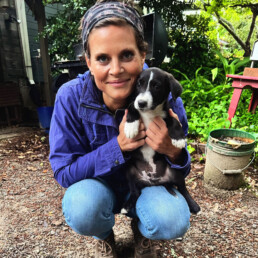
Sincerely,

Chris Cabral, CEO
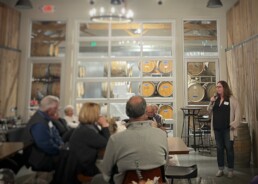
Above: COTS Care Manager Nichole talks during the Fall 2023 Investor’s Update about her experiences as a COTS client and Care Manager.
Your support will ensure that those experiencing homelessness in our community will have access to shelter, nutritious meals, physical and mental healthcare, and more. To learn about how COTS impacts those in our community read our Care Manager Nichole’s story of how she went from living on the street to helping others in need.
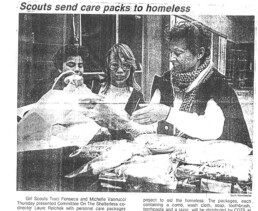
Above: Girl Scouts from Troop 76 deliver personal care packages to Laure Reichek, former co-director of COTS, January 26, 1990.
For 35 years, the Sonoma County community has supported COTS through donations, drives, and more. We could not be more thankful for your continuous support as we increase our supportive services, expand our housing assistance options, and continue to help those in need until we become a community where everyone has a place to call home.
If you would like to DOUBLE your impact, donate today, and help us meet our Holiday Match Challenge of $115,000.
James' Story
As a self-described hard-headed child, former COTS client, James has always been determined to make his dreams come true. However, the cards of life have not always fallen in his favor.
James was working in Oregon when he had an opportunity to move to California. Unfortunately, soon after moving, he became badly injured. An infection enveloped his foot, making walking hard and working nearly impossible. James was injured, sick, living in a tent outside, and constantly visiting the hospital for his health.
Eventually, James received medical attention and was told about COTS’ Recuperative Care Unit (RC). James warily agreed he needed help and came into COTS’ RC. Quickly, he was astounded by the level of care he was given, stating, “They got me taken care of, like a king.” For the next few months, James stayed in RC. He was able to attend all necessary doctor appointments, heal, nourish his body, and build friendships with many of COTS’ staff. “This shelter helped me. This shelter showed me how to live.”
He recalls what made him change his hard-headed ways and start listening to the advice of COTS’ Staff. "There was understanding and [they] showed that somebody did care about you. [They] showed someone was willing to help you [even if] you’re like me and can’t read or write. . . Because I listened to what these people told me to do, I made it. If I hadn't listened to these people, I wouldn't have ever made it.”
(Pictured below: James and COTS' People’s Village Services Manager Stacie Questoni)
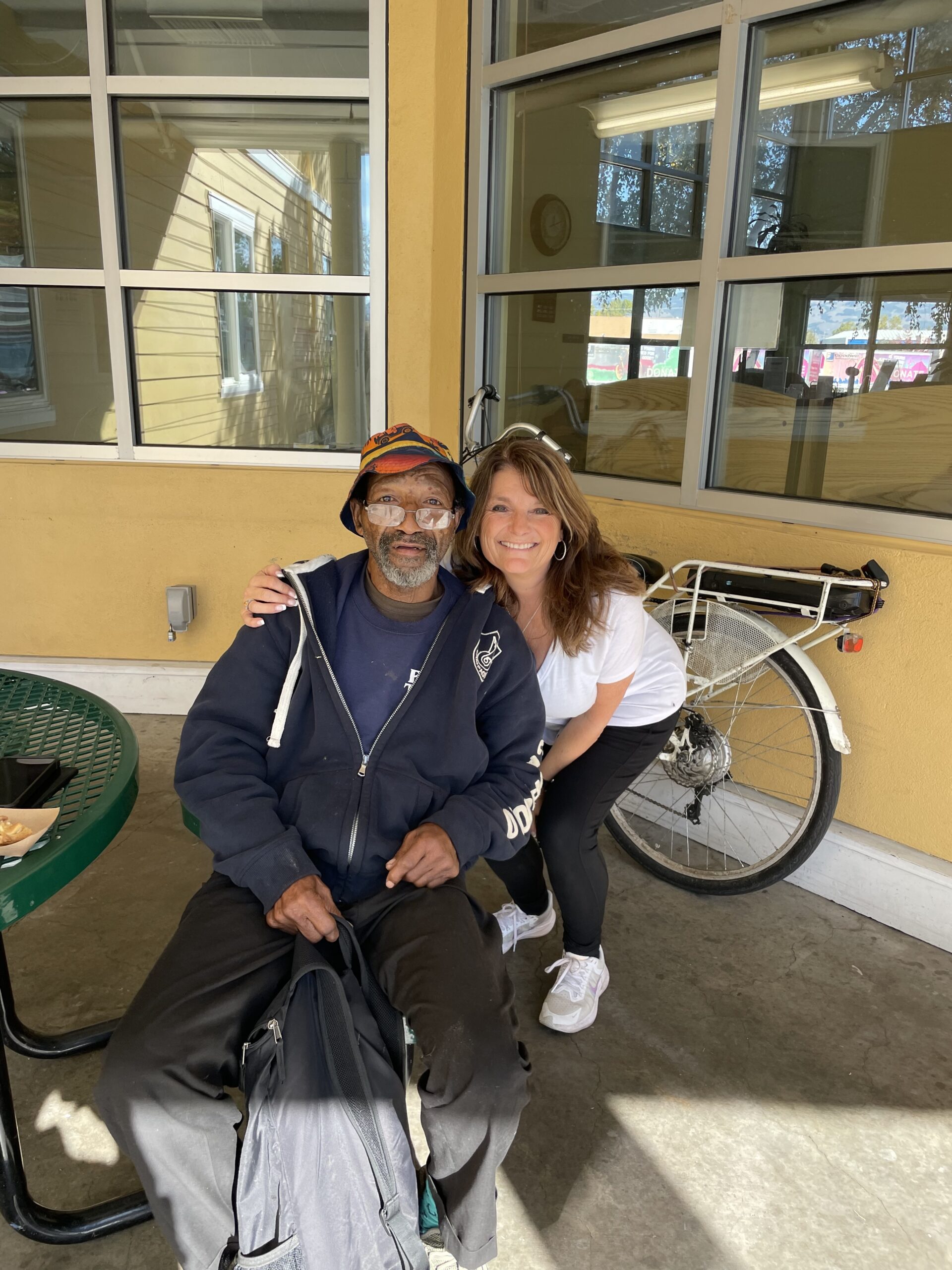
James stayed in RC until he was able to move into a little house in COTS’ People’s Village. Then, he began diligently working with COTS’ client services and the case managers to file all the appropriate paperwork he needed to eventually secure his own housing. Due to his age, James was also able to file for social security and retire. Praising the staff for getting him to where he is today, James says, “They just [kept] me focused. I had someone to talk to [and it] meant a lot. They [told me] which way was the right way and which way was the wrong way. If they saw me going [the wrong way] they stopped me and corrected me. [They] put me back on the right track.” He credits everyone he met at COTS: Sean Andrews, Chris Inclan, Stacie Questoni, Robin Phoenix, Fionn Robertson, Chef Janin, and many more former and current COTS staff members for “getting him to the top.”
Finally healed and freshly retired, James was able to start saving money for an apartment deposit. He worked small jobs to supplement his social security and after around six months, James was ready. With his saved cash in hand, he was able to secure the apartment he still calls home today and begin dreaming big again.
Despite James facing more health difficulties as he gets older, he still has a big dream of opening his own business that will hire people to clean yards, windows, and other chores that he once did to earn money. He wants to give people the chance that COTS gave him and does not hesitate to give those he sees struggling a few dollars when he can.
But James does more than help people out with money, he seeks to inspire those around him to get help as well. He shares his story with anyone who wants to hear it, often laughing at people’s disbelief that he was able to go from a man who could barely walk to where he is today. “They look at me and they don't believe it. They look back, [to when I had nothing and] now I've got my own place to live. I’ve bought me a motorcycle and I’m still saving up. I might buy me a house one day or a little piece of property and build a little house. If I can do it, anybody can do it!”
Nichole's Story
In 2022, COTS transitioned to a housing-focused model. However, the scope of care at COTS still extends beyond providing basic shelter. COTS’ mission is to assist those experiencing homelessness to find and keep housing, increase self-sufficiency, and improve well-being, something one of our Care Managers, Nichole, knows both sides well.
Before becoming the beloved Care Manager that she is today, Nichole spent about 9 years homeless, in and out of shelters and street living. In 2014, Nichole was able to become substance-free with the help of COTS and moved out to live independently. During her time away, Nichole stumbled away from her sobriety but was resolved to change things when she returned to COTS again in 2019.
While staying with COTS, Nichole was given the opportunity to work temporarily with COTS’ Winter Shelter. While COTS has since found other ways to care for the community during the winter months, the Winter Shelter allowed both clients and non-clients of COTS to stay in a warm place for the night. While this role proved to be challenging at times, Nichole stuck with it.
Her tenacity and compassion caught the eye of Robin Phoenix, COTS’ current Program Director, who soon offered her a job, with the condition that Nichole would have independent stable housing, as COTS full-time staff members cannot be clients concurrently. Due to Nichole’s drive and temporary employment with COTS for the Winter Shelter, she was able to save enough money to move into a sober living environment. Once Nichole was securely housed, she became a key component in the kitchen staff at the Mary Isaak Center, assisting our amazing Chef Janin.
After about a year in the kitchen, Nichole moved to be a Site Coordinator for COTS. This is the person you typically see at the front desk when you enter the shelter. Continuing to grow in her career, Nichole came into the role of COTS’ Care Manager, which she still holds today. She has been a wonderful Care Manager for COTS for about two years and is still passionate about helping clients. As she states, “I am really looking forward to staying with COTS for as long as possible. I’m very excited about upcoming programs, seeing the changes from the strategic plan, and I rejoice every time some of our clients get housed”.
Nichole continues to lead with compassion, understanding that our clients, like many people, may struggle with mental health or substance abuse, but they do not have the luxury of going through their struggles in a safe and private home. She understands that many people do not ask for help for fear that no one will understand and rejoices when she gets to work with people willing to make changes and ask for the help they need. Nichole wants everyone to know, “You are human. We do understand, and we’re going to help you get to where you want to be.” She only hopes that afterward, her clients will continue to make good decisions for themselves.
Thank you, Nichole, for being a part of the COTS crew for four years and counting. We appreciate all that you do!
The COTS Collective: October 2023

Mission Moment: Kids First Family Shelter:
Providing a Safe Haven for Petaluma Children and Families.
Since 1988, COTS has served our community as one of the largest homelessness services providers in Sonoma County. Many people in Petaluma and the surrounding area know about the COTS Mary Isaak Center—our emergency shelter for unsheltered adults in Petaluma. Fewer people know about the COTS Kids First Family Shelter (KFFS.)
KFFS offers safe and supportive shelter space for families with minors living in Petaluma and the surrounding area. COTS can house up to seven families at KFFS at any given time. In addition to shelter, KFFS also provides supportive services for families including case management, assistance enrolling children into area schools, assistance with establishing a primary care provider and transportation to appointments, and assistance developing meaningful pathways to employment.
Over the last year, KFFS has continued its tireless pursuit of supporting unsheltered families and their children in Petaluma. Over the holidays, COTS provides numerous fun activities and gifts for children and their parents including Halloween costumes, cookie decorating, Christmas gifts, and a Thanksgiving meal.
Unfortunately, KFFS has a long waiting list of families who need our support. While COTS is in awe of the impact our community has on these families, our goal is to be able to support every family in need throughout Sonoma County.
Through the unwavering support and generous contributions of our donors, COTS is able to continue our tradition of serving families who need us most. We invite you to support this incredible program and thank you for your continuing support of our important work. We thank you for your dedication to our mission.

Sincerely,

Chris Cabral, CEO

“That stepping stone that COTS gave us was really, really great, and everything is for the better for it. We finally got ourselves to a point where we can build from, so it’s just up from here. We’re just so appreciative of the opportunities COTS gave us.”
-Brandy, Luna’s mom and former client at Kids First Family Shelter
Lupe's Story
A former COTS' client, single mother of two, and graduate from Sonoma State, Lupe Gonzalez, took time from her busy day to tell us about her story, her time at COTS, and where she is today.
Lupe came here in 2014 with her daughter and started school at Sonoma State. She was able to find a small studio in Santa Rosa and work two jobs: one at Sonoma State and one at the food bank, but she was commuting a lot.
After months of the long commute, she thought, "Okay, this is not working" and began looking for a place to live that would be closer to Sonoma. When she finally found her dream place, she sent all her savings in for a deposit. Unfortunately, it was a scam. "I lost pretty much everything. I learned my lesson from that, but I went through a little meltdown where I was hospitalized." Lupe recalled.
At the time, Lupe was also going through a divorce with her ex-husband who was struggling with his mental health. She held onto hope that the relationship would work out but also wanted to stay away from that situation. "I wanted to be better. I am the first one in my family to go to college. When I started school, I had all these dreams and ambitions." I thought, "I'm going to get it done. And even though I'm a single mom, I’m going to do it!"
After getting scammed and hit by a depressive episode, Lupe and her daughter ended up homeless for three months. Sometimes her daughter was able to stay with a friend, but there was not enough room for both of them. Lupe often had to sleep in her car. During this time, she was able to make things work and shower at Sonoma State until she found a room to rent. Unfortunately, the room was located in Santa Rosa again, which meant her commute would increase. The room was not a safe space for long as the landlady often criticized Lupe's parenting styles and proved to be invasive into their business. Lupe made it work for three months until Sonoma State got her a hotel for a couple of months. This was good, but it was still just temporary.
Through a co-worker of her ex, Lupe was able to find a living room space for rent that would only cost around $300. In this space, Lupe and her daughter were able to sleep safely and had access to the bathroom. Soon after moving in, problems between the current residents there started. This left Lupe and her daughter in the middle of arguments and back in an unsafe environment with less and less space as another person moved into the house. "Living here was not going to work out. We were homeless again, and I was struggling."
While Lupe continued her search for housing and her education, her ex-husband challenged her for full custody of their daughter. "I was worried about doing what was best for my daughter." I thought, “Is she going to be better going with her dad? Is she going to be better with me?” He was not mentally stable, but I was homeless. Seeing her struggle, Lupe's then-boyfriend at the time offered her and her daughter a space to live with him and his family. They moved in and were happy as life progressed. Her daughter was safe, and Lupe and her then-boyfriend were able to get a job at the same location and commute together each day.
With her housing situation seemingly sorted out, Lupe finally won full custody of her daughter and learned she was expecting a second child. Her victory celebration was cut short when a switch flipped in her then-boyfriend, and he became abusive. During her pregnancy, Lupe endured mental, physical, and verbal abuse while trying to protect both of her children. Afraid of losing her family, she went into survival mode.
After her beautiful son was born, she and her then-boyfriend decided to give their relationship one final shot while living on their own in Petaluma. The first year was good, but then her boyfriend quit his job because he was not getting promoted. While he was unemployed, Lupe paid the bills, worked, and cared for her children. Luckily, he was able to find employment again and started working in their apartment building. He was earning a lot of praise for his work, but behind closed doors, he became abusive again. The verbal abuse expanded to her daughter this time though and that was the final straw for Lupe.
Because she already had trauma from previous experiences, she became very protective of her daughter. Lupe took action and called the cops. CPS also got involved by offering the couple therapy. It was in a therapy session that Lupe realized her then-boyfriend was not going to change. Lupe decided she wanted to leave him and started making a plan with her social worker to move out. He was very angry, but Lupe and her children were out of the apartment. While she waited for shelters to respond to her applications, Lupe and her children moved in with a coworker and then her ex’s brother- anywhere they could find space and stay together.
Around October 2018, Lupe moved into COTS with her two kids. During her stay, she applied to many apartments, saved money where she could, and planned for their future. It was hard living with other families and sharing spaces in the shelter, but COTS gave her the essentials and resources to keep moving forward.
In February 2019, Lupe received great news - she had been approved for an apartment. While Lupe was grateful to have an apartment, a job, and a car, she was working in Novato and her new studio was in Santa Rosa. Her long commute began again. As she began renting the studio, Catholic Charities stepped up and provided help through rental assistance for the first year. Then, Lupe got rental assistance for another six months through the Secret Santa Program. As her assistance was about to expire, Lupe received a call from Eden Housing. She was approved for a more sustainable living situation.
In 2021, Lupe began renting the apartment she and her children continue to live in today. It is a three-bedroom place that allows each of her children to have their own space. But even as days turn into years of housing stability, Lupe says she still can't relax. “I still can’t feel like it's mine. I'm always like on edge. I'm always afraid I'm going to lose it.”
Even while working, Lupe has struggled to pay rent for a few months, and it takes her back to her state of survival. Her fear of returning to a shelter with her kids swirls in her head. She worries that while she was able to get into a shelter last time, she may not have the same luck again. Lupe spoke about her thoughts of quitting during particularly difficult times, but "no matter how badly I have wanted to quit, I have always gotten up." When she is at a low point, Lupe says, "I remember the moment I got a call from COTS saying, 'Hey, we got a spot for you' and how their support during and after leaving the shelter, changed everything for us. COTS gave me the hope I needed to keep going!"
The Holiday Crafterino Returns in 2023!
 This year the Holiday Crafterino returns! Join COTS and over 50 vendors for a beautiful, holiday-themed, family-friendly arts and crafts fair. All door donations and raffle ticket proceeds will support COTS in our mission to create a community where everyone has a home!
This year the Holiday Crafterino returns! Join COTS and over 50 vendors for a beautiful, holiday-themed, family-friendly arts and crafts fair. All door donations and raffle ticket proceeds will support COTS in our mission to create a community where everyone has a home!
Care Managers: Breaking Language Barriers
Ana Calles
29% of individuals experiencing homelessness in Sonoma County are Latinx. We sat down with Ana Calles, one of COTS’ bilingual care-managers to talk about how her position supports COTS’ mission to implement policies and practices of social equity that empower a diverse and inclusive environment for staff, volunteers, clients, programs, and the communities we serve.

What brought you to COTS?
I was previously homeless and stayed in transitional housing with my child. I have always held shelters in my heart and have a passion for helping people. COTS has always been known as a great shelter, and they have many important programs that support our most vulnerable population. When I came for my interview, I knew it was going to be the right fit.
Tell us about your previous experience.
I grew up in low-income housing projects with all different types of people. I have always been drawn to helping people and can relate to many different situations. I decided to get my bachelor’s degree in Criminal Justice and Criminology as well as my master’s degree in Public Administration. I volunteered to advocate for childcare and early education and support low-income parents. I was on the Board of Directors at NAMI (National Alliance on Mental Illness) and a Warmline Specialist for a year.
Tell us about a typical day in the life of a bilingual care manager.
My day-to-day care management load varies. When I see my monolingual Spanish-speaking clients, I am usually working with them to try and find employment/income and/or citizenship paperwork. Working as a bilingual care manager, I am spending more time with clients, giving them rides to the doctor’s office, providing verbal translation, and calling Partnership for rides. I also make many types of appointments and translate all paperwork and texts that clients receive in English. I focus a lot on job searches where the employer does not mention applicants needing a social security number.
What are some of the biggest challenges facing your Spanish-speaking clients?
It can be very challenging to navigate employment options for my clients because some are undocumented. They struggle to find an employer that will hire them without requiring a social security number verification.
Most of my Spanish-speaking clients struggle to find employment and because of their citizenship status, they cannot receive government assistance, such as SNAP, GA, or SSI. These clients typically have to find an under-the-table type of job and still pay for a room to rent, as they usually cannot be referred to housing due to their lack of social security numbers. While it is a struggle to find them housing, I also make sure they have adequate resources by making sure our documents here at COTS are in Spanish. If they are not, I translate them.
Donald's Story
Before COTS, Donald was living a successful life with a good job. But as he said, “everything fell apart, and then I fell apart.” His relationship with his children wasn’t in the best place. He hadn’t spoken to one son in almost two years. His daughter lived out of the state.
When COVID hit, Donald moved in with his sister, Stella, to be her full-time caretaker. Sadly, Stella’s health continued to decline and her son stepped in to move her to a care facility and Donald was told to move out. But he had no place to go.
One of his sons told him he had to go to COTS. It was near his work, so Donald could visit, and a stay at COTS would give him time to find housing.
It was a hard choice, but he decided to go to COTS. Soon into his stay, he met with volunteers and staff in our Red Tape Club to get the assistance he needed to find housing.
Donald learned he was eligible for social security. So, he secured his own ride to the Social Security Administration to get his card and secure his benefits. He found out he was able to work and receive benefits, so he set his sights on getting a job.
Lucky’s grocery store is a close walk from COTS. He spoke to a manager about getting a job and was told to apply online. “I don’t know how to use computers”, said Donald, so a Red Tape Club volunteer helped him fill out the online application and was hired immediately.
Donald had a strong drive to get his life together and get his family back. That drive and focus became a real inspiration for several clients. “My old bunkie told me when I come here and see you it makes me know that I can do it that, I can that I can survive.” Donald was a great listener for fellow residents, many of whom just needed a listening ear, but he was also quick to tell them that they needed to put in the effort if they wanted to see a change in their life.
Eventually, Donald was able to secure housing right before the holiday season. He hosted Thanksgiving for some of his friends he’d made at COTS. As they sat down to eat, one of his friends started to cry – it was his first time having a family style Thanksgiving dinner.
Then, his wish to reconnect with his family came true. His two sons came to his new place on Christmas Day. He now has a daughter-in-law and a grandson in his life. His kids told him, “We’re proud of you dad, we’ve got you back.” He’s reconnected with his ex-wife, who recently helped get him to a doctor’s appointment.
Today he’ll tell people, “Thank God for COTS.”. He tells his boys, “If it wasn’t for COTS, I wouldn’t have you back in my life.” He’s grateful that our founders had the vision to create COTS, so there would be a place in our community where individuals and families could get help.
He recalls when his son first told him to go to COTS. “I didn’t want to go there, I told him please don’t do this to me, but it saved my life.”
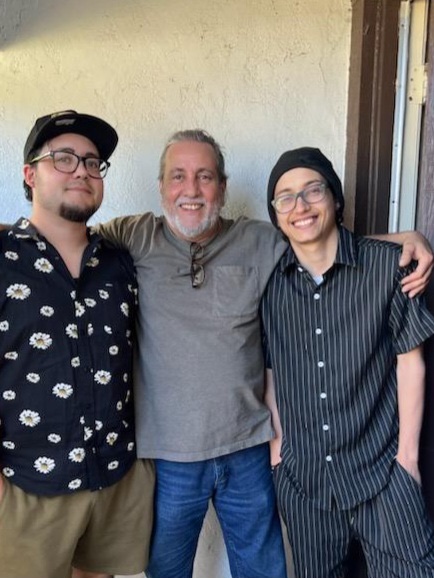
The COTS Collective: September 2023

“ I am so grateful to have such well thought out healthy meals, I couldn’t heal properly without them.”
– Linda Guajardo
Mission Moment: Mary’s Table Needs Your Help!
Since 1988, COTS has served our community as one of the largest homelessness services providers in Sonoma County. Did you know that COTS also serves anyone in the community experiencing food insecurity? Every day, COTS prepares hot lunches and dinners for anyone in Sonoma County who needs a warm meal. This year, COTS will prepare and serve more than 90,000 hot meals to our neighbors throughout Sonoma County, ensuring everyone has access to hot, nutritious food every day of the year.
During the height of the pandemic, our kitchen operations had to quickly pivot to keep our community members safe. While preparing and serving individually packaged meals increased the workload on our staff, COTS was happy to make this shift to provide a safer dining experience for any individual or family needing meals. This shift also helped COTS provide a safe place for our clients, including families, those in transitional shelter, and those in our emergency shelter right here at the Mary Isaak Center.
Between 2020 and 2023, the COTS kitchen has increased the number of hot meals served to our community by more than 30%. This increase in need demonstrates the effects that the pandemic and historic inflation had on our neighbors in Sonoma County. This incredible increase in need has also strained COTS’ capacity to serve everyone in need, and we could use your help!
Mary’s Table is one of the most successful—and one of the busiest! —programs here at COTS. Without community support, COTS could never serve over 90,000 meals annually. If you are interested in helping COTS continue eliminating food insecurity in Petaluma and throughout Sonoma County, you can donate at our website at www.cots.org. If you are interested in volunteering at Mary’s Table, please reach out to Erin Krueger at EKrueger@cots.org. COTS appreciates all support from our community, and thanks you for your interest in helping Mary’s Table!
Until next time,
Chris Cabral

Sincerely,

Chris Cabral, CEO
“I love the fact that the kitchen always serves fruit, vegetables, and salad along with the main meal as a complete meal is crucial for my healing process.”
– Ahmed Shaheed
“ The kitchen provides great meals, and atmosphere, that creates the opportunity for a whole healing experience.”
– Florence Cocoran
” Chef, and her team, play a crucial part in the healing needs of my clients, the meals that are created play a very important part in recovery process of our clients. I would [be] remiss not to mention that the meals created are tasty too.”
-Pat Higgins


